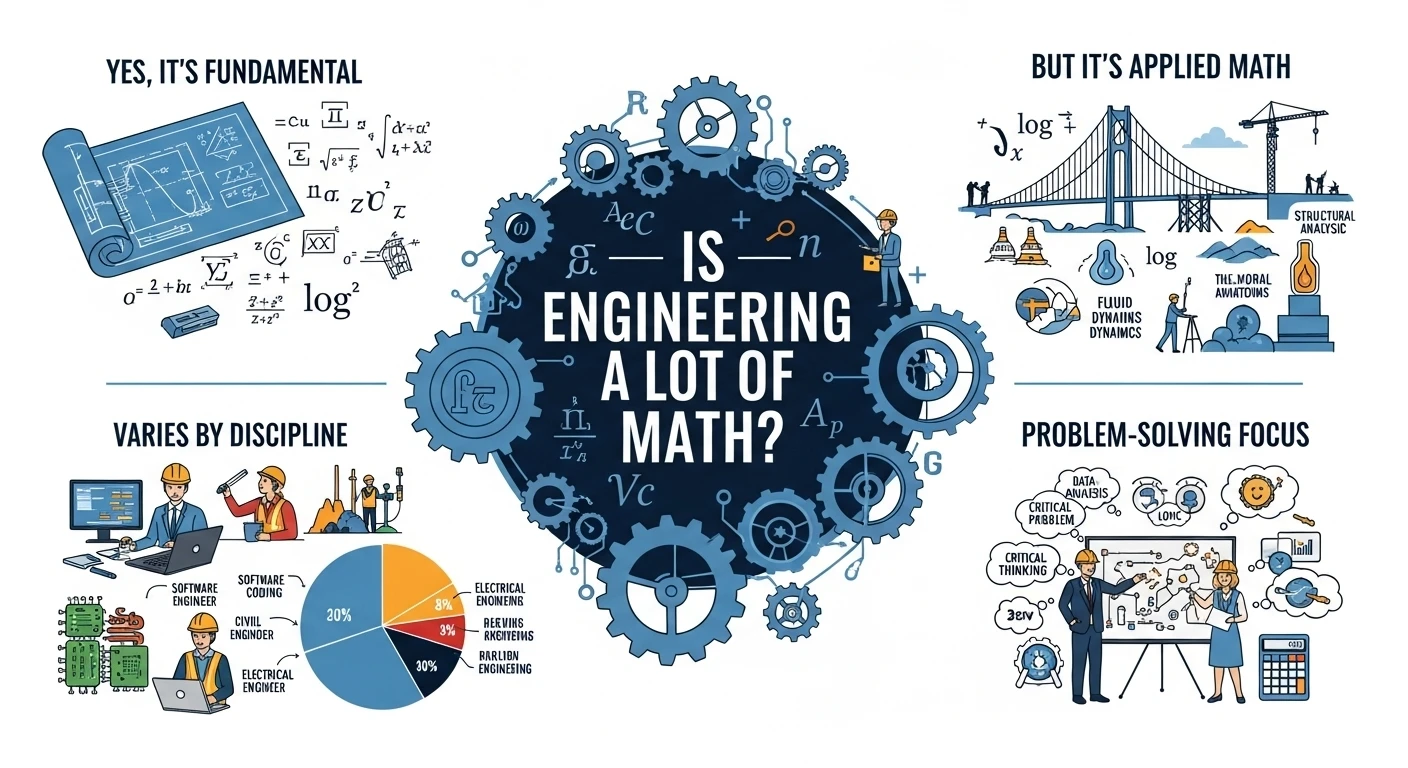Many people considering engineering as a career ask the same big question:
“Is engineering really a lot of math?”
The short answer is yes, but the full story is much more interesting. Engineering doesn’t require you to be a math genius, but you do need to be comfortable with math as a tool. Think of math in engineering like a hammer to a carpenter: it’s not about showing off theory, it’s about building things that work.
In this guide, we’ll break it down in plain language so you can see exactly how math fits into different types of engineering, what you’ll study in school, and how much you’ll actually use in real life.
Also Read: 10 Things Engineers Really Do: A Simple Guide
Why Math Matters in Engineering
Engineering is about solving problems and designing systems — from bridges and airplanes to apps and medical devices. Math is the language that makes these designs possible. Whether you’re modeling airflow around a jet engine, analyzing stress on a building, or writing algorithms for AI, math shows you what will happen before it’s built.
But don’t worry: engineers rarely sit around proving abstract theorems. Instead, they use math to predict, optimize, and improve real-world systems.
How Much Math Do You Really Need?
Different engineering majors use math differently. Some rely heavily on calculus and differential equations, while others lean more on statistics or discrete math.
Here’s a simple breakdown:
| Engineering Field | Main Math Topics Used | Real-World Examples |
|---|---|---|
| Civil | Calculus, statistics, linear algebra | Bridge design, soil analysis, hydraulics |
| Mechanical | Calculus, PDEs, numerical methods | Heat transfer, fluid flow, vibrations |
| Electrical | Complex numbers, linear algebra, transforms | Circuits, signal processing, control systems |
| Chemical | Differential equations, multivariable calculus | Process design, reaction modeling |
| Computer/Software | Discrete math, logic, probability | Algorithms, cryptography, AI/ML |
| Industrial/Systems | Statistics, optimization | Logistics, operations research, process control |
| Biomedical | Differential equations, statistics | Medical imaging, physiological modeling |
As you can see, math is always present — but the type and depth depend on your path.
The Math You’ll Learn in an Engineering Degree
If you study engineering in college, expect to see a steady flow of math courses, usually in this order:
- Calculus I & II – the basics of limits, derivatives, and integrals.
- Multivariable Calculus – working with functions in 3D.
- Linear Algebra – matrices, eigenvalues, and vector spaces.
- Differential Equations – modeling systems that change over time.
- Probability & Statistics – handling uncertainty and data.
- Numerical Methods – how to approximate solutions on a computer.
- Specialized Math – depending on your field: control theory, discrete math, optimization, or Fourier analysis.
These courses aren’t just “math for math’s sake.” Each one connects directly to engineering problems — like predicting how a structure bends, how heat spreads, or how signals can be filtered.
How Engineers Use Math in Real Life
Now here’s the part that surprises many students: most practicing engineers don’t spend their day solving calculus problems by hand. Instead, they use software like MATLAB, Python, AutoCAD, ANSYS, or SPICE to handle the heavy lifting.
What matters most is that you understand the math behind the tools. That way, when the computer spits out a result, you know whether it makes sense — or whether the setup was wrong.
Examples:
- A civil engineer might use finite element analysis software to check if a bridge design can handle stress.
- A mechanical engineer might simulate airflow in a turbine using computational fluid dynamics (CFD).
- A software engineer might apply probability and linear algebra to machine learning models.
In all cases, math provides the foundation, but software is the daily driver.
Do You Have to Be a Math Genius to Be an Engineer?
Absolutely not. What you really need is persistence, logical thinking, and the willingness to practice. Many successful engineers struggled with calculus at first but improved through steady effort.
If you dread math completely, some roles (like project management or construction oversight) use less of it day-to-day. But if you want to do design, simulation, or R&D, math will definitely be your friend.
Tips for Making Math Easier in Engineering
- Focus on concepts, not just formulas. Understand what a derivative means instead of memorizing.
- Practice often. Engineering math is a skill, not a talent.
- Use visual tools. Graphs and simulations make abstract concepts easier.
- Leverage software. Learn MATLAB or Python early — it’s a game-changer.
- Connect math to real problems. It’s more motivating when you see the bridge, robot, or code you’re designing.
Also Read: The 7 Types of Engineers — A Long, Technical Overview
FAQ: Honest Answers About Engineering and Math
No. Math is important, but much of engineering is teamwork, design thinking, communication, and using tools to bring ideas to life.
Industrial engineering and some areas of computer/software engineering often rely more on logic, statistics, and optimization than advanced calculus.
You’ll use it differently. Early on, you’ll solve equations by hand. Later, you’ll rely more on software, but the math knowledge helps you make sense of results.
Yes. With practice, support, and persistence, many students who doubted themselves have gone on to have thriving engineering careers.
Final Thoughts
So, is engineering a lot of math? Yes — but it’s not about memorizing endless equations. It’s about using math as a tool to create, design, and solve real-world problems.
If you enjoy puzzles, logical thinking, and practical problem-solving, you’ll likely find engineering math challenging but rewarding. And remember, math isn’t the goal — the bridges, machines, software, and innovations you build with it are.










